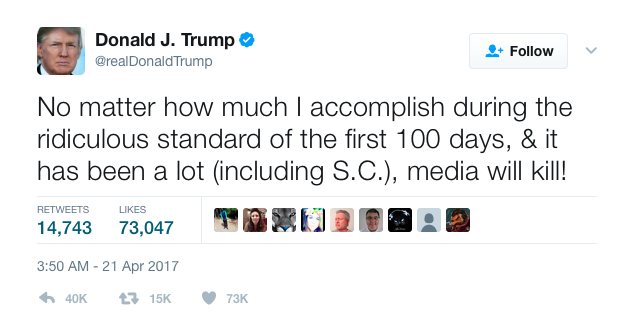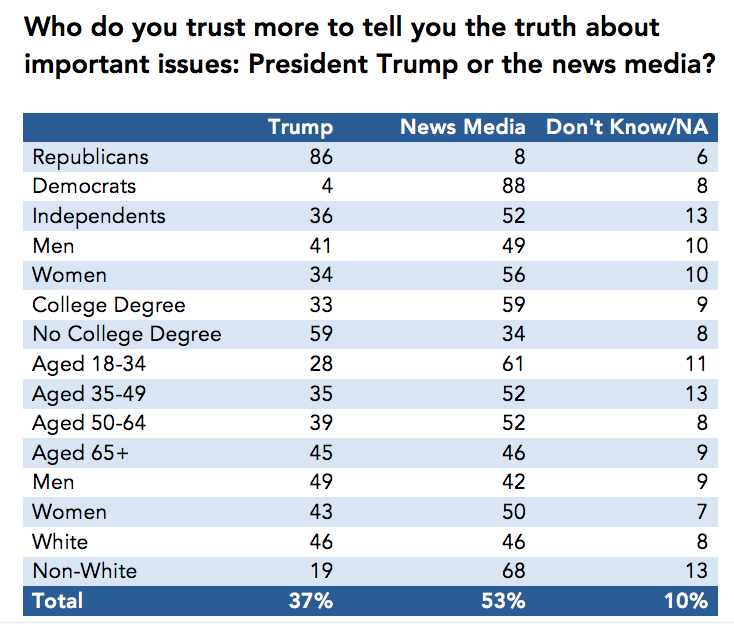The President will mark the occasion by doing something he loves. And that’s not being mocked in front of journalists.
Among all the comparisons this week of what successive US Presidents have managed to accomplish in their ‘honeymoon period’, chances are you’ll hear the joke that William Henry Harrison had a better first 100 days than Donald Trump – and he was dead for 70 of them.
The ninth president succumbed to pneumonia in April 1841 after delivering the longest inaugural speech in history. During a rainstorm. Without an overcoat.
While maybe the only thing of political note his short presidency will be remembered for is the confusion over his successor – John Tyler became the first Vice-President to step up after basically appointing himself – Harrison was also something of a populist who by all accounts loved the adulation of the crowd and was more than happy to believe his own hype.
This Saturday, Donald Trump will hold a rally in Harrisburg, Pennsylvania to mark his 100th day in an office that, even in this short time, he has fundamentally altered.
He dismissed the significance of the 100-day period – in a Tweet, naturally – as a “ridiculous standard”, yet it was one he himself was keen to promote during the campaign, promising a “contract” of measures he’d accomplish in that period.
Needless to say, most of them remain a work in progress.

Despite assembling what the Washington Post called “the worst cabinet in American history” and having any number of close associates investigated over ties to Russia, Trump sticks to the line that he’s “getting things done” through a range of executive orders – he will have signed 32 by Friday, the most by any President since World War Two.
But his reliance on that tool just emphasizes the difficult relationship between the White House and the Republican-controlled Congress.
In looking for “wins” Trump points to Neil Gorsuch’s Supreme Court appointment – a spot of course controversially held over from the previous administration – and overseas might allude to a more clearly defined red line on chemical weapons use in Syria, or “sending a message” to North Korea by dropping a huge bomb in Afghanistan.
But all of those global situations could still go any one of a number of ways. Which I suppose is a fair description of the administration itself.
With an historically low approval rating at this point – to which Trump’s base for now seems impervious – the White House appears desperate to pass some substantive piece of legislation. Congress returned from recess this week to wrestle with a messy do-over on healthcare and a tax plan, as well as the possibility of a federal government shutdown over funding.
Trump’s most high-profile campaign promise and probably the single policy measure that best characterises his presidency – the Border Wall – could be the casualty that keeps the lights on.
Meanwhile, the nation remains as polarized as ever. We’ve also seen 100 days of public resistance; from the Womens’ March the day after the inauguration, to the March For Science in the past few days, both events notable for being worldwide in their scale and sentiment.
And as always – as it was during the campaign – any failure on the part of the President is at least partly the fault of the “fake” media.
There are many things about this administration that are unprecedented, but never has there been a more adversarial relationship between President and press.
From branding certain news outlets “enemies of the people” and changing the nature of how the White House press corps operates, the administration’s antagonism towards the media has grown and – dangerously – taken root among Trump’s supporters.
A Quinnipiac poll recently showed a stunningly huge gap along party lines between those who predominantly trust the President and those who trust the media.

Source: Quinnipiac University Poll, 7 March 2017
As well as Trump’s 100th day, this Saturday also marks the annual White House Correspondents’ Association dinner – usually an opportunity for both sides to poke relatively good-natured fun at each other and for a guest comedian to go after everyone.
In one of the most noteworthy speeches of recent years Stephen Colbert’s faux right-wing pundit found George W Bush a willing foil, although it wasn’t always obvious when Bush realized Colbert was joking.
It’s also a chance for the President himself to demonstrate that he can give as good as he gets.
Some accounts say it was President Obama’s humiliating roast of Trump in 2011 – calling out the man who’d led the birther movement against him – that helped make up Trump’s mind to seek the highest office.
While there has undoubtedly been a huge amount of noise and a lot of distraction around this White House – often it’s been hard for ordinary readers and viewers to keep up – there also hasn’t been this level of self-examination, some might say self-flagellation, by the US media over how best to serve its audience in a very long time.
There were certainly many faults in how Trump’s campaign was presented, but we also saw some of the best reporting in recent years, with the Washington Post’s David Fahrenthold deservedly winning a Pulitzer Prize for his relentless work on the truth behind Trump’s philanthropic activity.
And just last week an extensive investigation by reporters at USA Today showed details of Trump property sales and their potential for conflicts of interest for a President whose failure to completely divest his business interests and continued reluctance to release details of his taxes has served only to heighten speculation.
So there is hope – and subject matter – for serious journalism.
Saturday night’s “NerdProm” will be interesting to say the least.
Trump, of course, won’t attend. He has that big rally, after all, and an opportunity to sell more hats. The last President to skip the function was Ronald Reagan in 1981 when he was recovering from an assassination attempt.
While the current incumbent will doubtless watch a recording later, it won’t be the same if the butt of the jokes isn’t there to hear them.
As Attorney General Jefferson Beauregard Sessions III said recently, addressing the reaction to his strange criticism of a Hawaii judge: “Nobody has a sense of humor anymore”
As often in politics, I guess it depends whether they’re laughing with you or at you.
You should be able to watch the White House Correspondents Association dinner on Saturday at C-Span.org.
